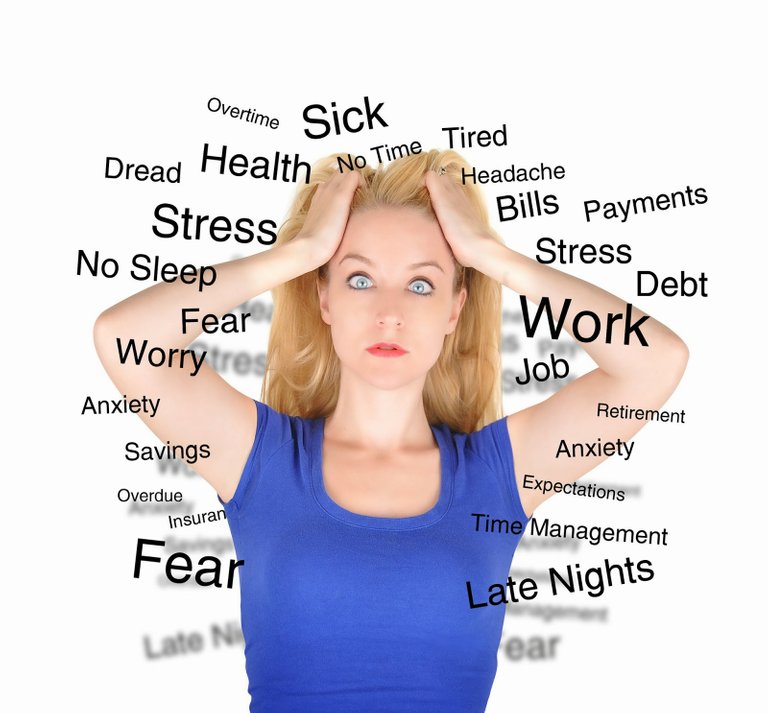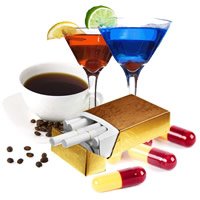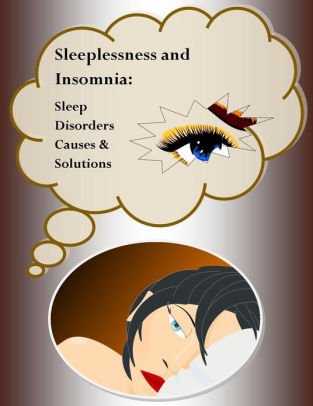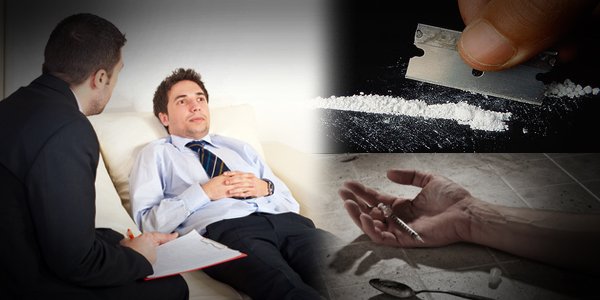What causes insomnia
Insomnia
Insomnia affects millions of people around the world and can be defined as sleep disorder, which makes a person sleep, or difficulty staying, or waking up early and being unable to go back to sleep , Sometimes accompanied by feeling tired after waking up. Insomnia can affect people of any age, and between adults is more common in females than males. Insomnia greatly affects the lives of those who suffer from it. Their performance at work or school is disrupted, obesity may also cause anxiety, depression, and concentration problems. ) And memory problems(Memory problems), and Poor Immune System Function. It should be noted that the number of sleep hours of individuals in general, but it can be said that most adults need seven to eight hours of sleep every night. [1] [2]
Different Insomnia
Insomnia is divided into two types depending on the duration: [1] [3]
Acute Insomnia: This type is short-lived and lasts for a few days or a week, usually due to stress or stress or traumatic events such as the night of the exam or after hearing the bad news. Many people experience this kind of transient sleep disorder , and the problem is solved without the need for treatment.
Chronic Insomnia: Sleep disturbance means at least three nights a week and lasts for at least three months. Insomnia may be the underlying problem, or it may be related to a health condition, psychological problem or medication.
Causes of insomnia
There are many conditions and habits that cause insomnia, including: [4] [5]
Stress: Work, school, health, or family anxiety keeps the mind active during the night; it is difficult to sleep. And the problems of life and crises experienced by the human being may cause insomnia such as the death of loved ones, divorce, loss of work and others.
Traveling or work schedule: The body has an internal clock that regulates human sleep and wake up, metabolic processes in his body and temperature. This clock is called circadian rhythms, and any malfunction in these systems It can lead to insomnia, such as when the timing is different due to jet lag, shift working, and so on.
Poor sleep habits: Unhealthy sleep habits may cause insomnia without a major health or psychological problem, and may make the problem of insomnia already worse than before. Examples of these habits include unorganized sleep times and taking nap after Even if it is short, and activities that increase human activity before sleep, as well as the uncomfortable sleep environment and the use of bedding for the needs of non-sleep, such as work, eating, watching television and others may also cause insomnia.
Eating too much food at night: Eating too much food or eating fatty foods in the near future causes you to feel uncomfortable and uncomfortable, and therefore have trouble sleeping. Late dinner and food may cause some people to return acid from the stomach to the esophagus, or so-called heartburn, which will also hinder sleep.
Mental health disorders Many people are concerned about past and future events, which can cause insomnia. Also, depression and insomnia are linked to each other closely; the occurrence of depression causes insomnia , and increases each other 's symptoms worse.
Medicines: Some types of painkillers, sedatives and caffeine-containing drugs may cause sleep problems in addition to some antidepressants, asthma medications, blood pressure medications, and others.
Medical conditions: Sometimes, certain medical conditions or conditions - either in themselves or in the resulting symptoms - cause insomnia, for example: chronic pain, gastrointestinal problems, cancer, asthma, hyperthyroidism Hyperthyroidism, low back pain, and some neurological diseases such as Parkinson's disease and Alzheimer's disease.
Sleep Disorders: There are some disorders that negatively affect a person's sleep, such as sleep apnea, due to obstruction of his airways, and also Restless Leg Syndrom. A nervous origin gives an irresistible desire to move the legs.
Caffeine, nicotine and alcohol: Drinking caffeine in reasonable amounts and in the morning may increase the individual's energy and productivity, but eating caffeine-containing beverages in large quantities or late in the day may cause insomnia; caffeine is a stimulant that stays in the body for eight hours. For nicotine, it is also a stimulant. It is the main part of smoking products that are harmful to health. As for drinking alcohol at night, it helps to sleep at first, but prevents sleep and reaching the stages of blind sleep S.
Symptoms of insomnia
There are many symptoms associated with insomnia, including: [2]
Difficulty sleeping at night.
Waking up at night.
Waking early despite the desire to sleep.
Feeling tired and sleepy despite sleeping at night.
Irritability, irritability or anxiety.
Weak focus.
Increase in errors and accidents.
Headache tension .
Difficulty of social interaction.
Gastrointestinal symptoms.
Anxiety about sleep.
Treating insomnia
Insomnia is treated on the basis of its cause; many cases are treated after the underlying cause has been treated correctly. There are two types of treatments for insomnia, behavioral therapy and medical treatment. [2]
Behavioral cognitive therapy
Cognitive Behavioral Therapy is the first line of therapy; the cognitive part helps to identify and change beliefs that affect sleep ability, and control the thoughts and fears that keep a person awake. The behavioral part helps to develop good sleep habits, and avoid behaviors that affect sleep negatively. [6]
And the measures for the treatment of behavioral following: [6]
Control alarm clock treatment: (English: Stimulus control therapy); help this method to get rid of the factors that adapt to the brain to resist sleep; for example , the patient is trained on a fixed schedule for sleeping and waking, the patient is advised to avoid napping, and the use of bed to sleep. And leave the bedroom if the patient can not sleep within twenty minutes.
Relaxation techniques: (English: Relaxation techniques); progressive muscle relaxation and breathing exercises reduce anxiety sleep time; as the practice of these techniques help breathing control rate strikes heart , tight muscles and mood and thus help to sleep.
Restrict sleep: (English: Sleep restriction); this treatment depends on reducing sleep time in the day and avoid naps; and reduce the time to stay in bed.
Stay awake in a non - effective ( in English: Remaining passively awake); also called the opposite destination ( in English: Paradoxical Intention); where this method is designed to reduce the anxiety and fear of not being able to sleep by going to bed and try to stay awake instead of sleeping.
Drug therapy
Sleeping pills prescribed by a doctor can help you sleep or continue, or both, some of which are not recommended for more than a few weeks because of side effects such as daytime Grogginess, increased risk of falls . Even those over-the-counter drugs that help sleep can not be taken without a doctor's advice, such as antihistamines, for side effects such as drowsiness during the day, dizziness, confusion, cognitive impairment, and difficulty urinating. [6]
References
1- ^ A b Mayo , Clinic Staff (15-10-2016), "Insomnia" , Www.mayoclinic.org , Retrieved 12-9-2017. Edited
2- ^ A b T. Peter Crosta (20-7-2017), "Insomnia: Causes, Symptoms, And Treatments" , www.medicalnewstoday.com The , Retrieved 12-9-2017. Edited
3- ↑ "What is Insomnia?" , sleepfoundation.org , Retrieved 12-9-2017. Edited
4- ↑ Mayo Clinic Staff (15-10-2016), "Insomnia" , www.mayoclinic.org , Retrieved 12-9-2017. Edited
5- ↑ "What Causes Insomnia?" , sleepfoundation.org , Retrieved 12-9-2017. Edited
6- ^ A b T. Mayo , Clinic Staff (15-10-2016), "Insomnia Treatment" , Www.mayoclinic.org , Retrieved 12-9-2017. Edited
By Mohamed Jabr
I've been fighting my insomnia for how many months and thank you @arrihan for giving knowledge about this. @princessjoyesto
I'm an insomniac. I wouldn't wish it to happen to anyone, not even my worse enemy, so to speak. Being awake in the middle of the night, against your will, while the rest of the world sleeps peacefully, is a terrible form of solitude.
You got a 2.08% upvote from @postpromoter courtesy of @arrihan!
Want to promote your posts too? Check out the Steem Bot Tracker websitevote for @yabapmatt for witness! for more info. If you would like to support the development of @postpromoter and the bot tracker please
Very interesting article. What do you think about using melatonin?
Hi, yes insomnia is a big problem.. it's a good article!! ;) If you are interested in this kind of topics let's check my blog and my last article! :)
This post has received a 5.52 % upvote from @boomerang thanks to: @arrihan
such a great work thats how we should do, im glad for you having thoese upvotes , my best one 0.4 maybe lol the begainnig on steemit is a bit hard , we need some encouragement from you mates I belive in relation with this beautiful commuity, waiting to see your next professional work
Thank you for your comment. I told you that the work and gain from Steam should start with investing a bit of money, because the high voting value is not just writing the article, but supporting it by investing in some of the robot
This post has received gratitude of 3.61 % from @appreciator thanks to: @arrihan.